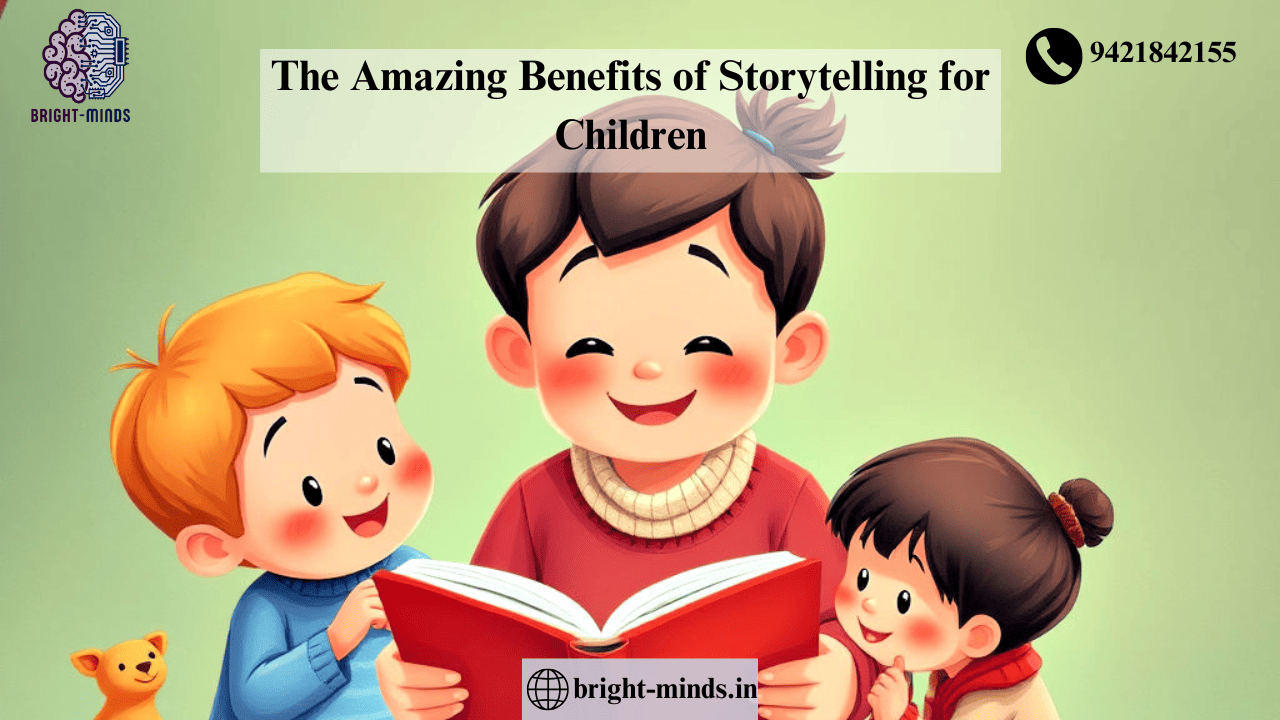The Amazing Benefits of Storytelling for Children
Storytelling is one of the oldest and most cherished forms of communication. From ancient folktales passed down through generations to modern bedtime stories, storytelling serves as a bridge between imagination and reality. For children, the benefits of storytelling extend far beyond entertainment. It’s an enriching activity that fosters emotional, intellectual, and social growth.
Emotional Development
One of the key benefits of storytelling is its ability to nurture emotional intelligence in children. Through stories, children experience a range of emotions—happiness, sadness, fear, and excitement—in a safe and controlled environment. When a character faces challenges or triumphs, children learn to empathize and relate to these emotions. This helps them understand their own feelings and those of others.
Moreover, storytelling can be a tool to address fears and anxieties. Stories with themes of resilience and overcoming challenges can empower children to face their own difficulties with confidence. For instance, tales of bravery can help a child struggling with stage fright or a fear of the dark.
Cognitive Growth
Storytelling stimulates a child’s imagination and creativity. As they listen to or read stories, children visualize characters, settings, and events. This mental imagery strengthens their cognitive abilities, including problem-solving and critical thinking skills. For example, when children are exposed to riddles or mysteries within a story, they are encouraged to think logically and anticipate outcomes.
Additionally, storytelling improves language skills. Listening to stories introduces children to new vocabulary, sentence structures, and idiomatic expressions. This enhances their verbal communication and comprehension abilities. As they retell stories in their own words, they practice articulation and narrative skills, which are essential for effective communication.
Social Skills
Stories often revolve around relationships and interactions between characters. By observing these dynamics, children learn valuable social lessons. They understand concepts like teamwork, cooperation, and conflict resolution. For instance, stories where characters resolve misunderstandings teach children the importance of communication and empathy in real-life relationships.
Group storytelling sessions, such as storytime in classrooms or libraries, also encourage social interaction. Children learn to take turns, listen actively, and share their thoughts. These sessions promote a sense of community and belonging, which is vital for their overall well-being.
Cultural Awareness
Storytelling serves as a window to different cultures and traditions. Through diverse narratives, children gain exposure to various lifestyles, beliefs, and values. This fosters an appreciation for diversity and helps them develop an inclusive mindset. For example, folktales from around the world often convey universal truths while reflecting unique cultural elements.
By understanding and respecting different perspectives, children become more open-minded and tolerant individuals. This cultural awareness is especially important in today’s globalized world, where intercultural interactions are common.
Moral Education
Many stories carry moral lessons that help shape a child’s character. Tales of honesty, kindness, and perseverance instill important values. For example, Aesop’s fables, such as “The Tortoise and the Hare,” teach children about humility and the rewards of steady effort.
When parents or educators discuss the moral of a story, it reinforces these values and helps children understand the consequences of their actions. This guidance contributes to the development of a strong moral compass.
Encouraging a Love for Reading

Storytelling often serves as a gateway to reading. When children enjoy listening to stories, they become curious about the written word. This curiosity motivates them to read independently, fostering a lifelong love for books and learning.
Reading stories has additional benefits, including improved concentration and focus. Unlike screen-based activities, reading requires sustained attention, which helps children build patience and discipline.
Strengthening the Parent-Child Bond
Sharing stories is a wonderful way for parents and children to spend quality time together. This activity strengthens their bond and creates cherished memories. When parents tell stories, they also convey care and attention, making the child feel valued and loved.
Bedtime storytelling, in particular, has a calming effect and can become a comforting ritual. It not only prepares children for restful sleep but also fosters a sense of security and stability.
Tips for Effective Storytelling
To maximize the benefits of storytelling, consider the following tips:
- Choose Age-Appropriate Stories: Select stories that match the child’s age and interests. For younger children, opt for simple plots and colorful illustrations. Older children might enjoy more complex narratives with intriguing characters.
- Be Expressive: Use different voices, facial expressions, and gestures to bring the story to life. This engages the child and makes the experience more enjoyable.
- Encourage Interaction: Pause during the story to ask questions or invite predictions. For instance, “What do you think will happen next?” This keeps the child involved and stimulates critical thinking.
- Incorporate Personal Stories: Share anecdotes from your own life or family history. These personal tales create a deeper connection and provide a sense of identity.
- Use Props and Visuals: Puppets, toys, or drawings can enhance storytelling and make it more interactive.
- Create a Storytelling Routine: Set aside dedicated time for storytelling, such as before bedtime or during family gatherings. Consistency helps make it a cherished tradition.
Conclusion
Storytelling is much more than a pastime for children. It’s a powerful tool that nurtures their emotional, cognitive, and social development while instilling valuable life lessons. By engaging children in stories, we open up a world of imagination and knowledge that shapes their future.
Whether you’re a parent, teacher, or caregiver, storytelling is an enriching activity that leaves a lasting impact. So, pick up a book, gather around, and let the magic of storytelling transform young minds.
Also Read:
https://bright-minds.in/unlocking-word-meaning-for-class-ukg-english-to-hindi/

